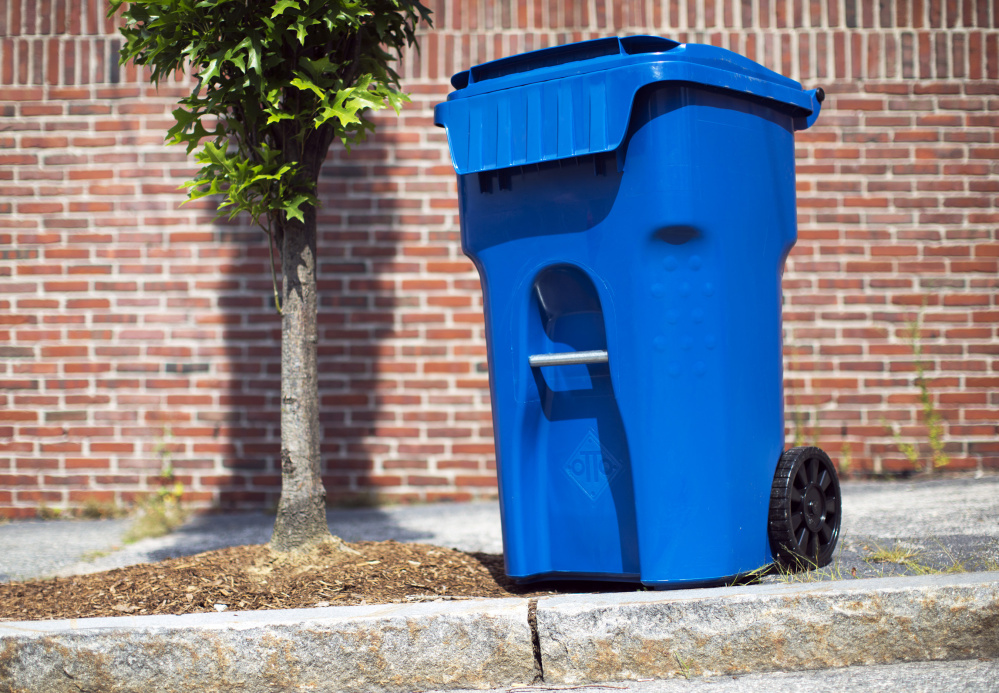Beginning next week, Portland residents will begin receiving new covered recycling carts with wheels –– a longterm goal of city leaders to reduce the litter that comes with the small, open blue bins.
Although city officials say public response has largely been positive, some property owners are worried about where to store the much larger containers, especially in the winter, when piles of snow fill what little outdoor space is available. Tenants in apartments will be sharing containers with others in their buildings, prompting additional concerns about who will wheel the bins to the curb.
“I think it works well in the suburbs when you have a garage,” said Stephen Smith, who owns a four-unit building in the Parkside neighborhood. “I think it’s the wrong idea for the peninsula.”
Mainland residents currently participating in the city’s solid waste program will begin receiving the new bins starting Aug. 7. However, island residents will need to request a container from the city if they want one.
City Hall Communications Director Jessica Grondin said it will take most of the month to distribute all 25,000 containers, which cost about $1 million.
Sustainability Coordinator Troy Moon said the city has received about $175,000 in grant funding from the nonprofit Recycling Partnership, based in Portland, Oregon, to offset the costs of the totes. The remaining $825,000 will come from city funds, so residents will not have to pay out-of-pocket to receive a cart.
Moon said the city is spending an additional $9,000 to outfit its fleet of six trucks with a tipping arm. However, city officials stress that trash collection will remain a manual job, with city workers wheeling the carts from the curb to the tipping arm, which will empty the contents into the truck.
Rolling out covered recycling bins has been a longstanding goal for city officials. It was among the top recommendations of the Solid Waste Task Force in 2011, Moon said.
The primary goal of the new bins is to reduce litter throughout the city, which can occur on windy days when residents overload their smaller bins with material.
Moon noted a recent study by the University of Southern Maine determined that recycling bins contributed to more than a ton of litter a week to Portland streets, which often ends up in storm water catch basins or blows out to sea.
“We have a fee on bags and have banned plastic foam, so I think this is really the next logical step to curb litter,” Moon said.
Grondin said that single-family homes and duplexes will receive a 65-gallon recycling cart, while apartment buildings will receive larger, 96-gallon carts.
Tenants will be expected to share the larger recycling cart with other building tenants, so the city is encouraging people to keep their smaller blue bins, which range from 16 to 18 gallons for indoor use. However, all recycling must be placed in the larger cart when it is placed to the curb.
Grondin said buildings with three to four units will receive one cart; five- to six-unit buildings will get two carts; and eight- to 10-unit buildings will get three. She said the city is encouraging people to put the carts out for collection when they are full.
Brit Vitalius, president of the Southern Maine Landlord Association, complimented the city on its outreach to the organization, but he shares similar concerns about how the carts will work in Portland’s densely populated neighborhoods.
“Storage for the totes will likely be a problem at some properties, but I’m more concerned about the shared responsibility to get it out on pickup day,” Vitalius said in an email. “Currently, tenants take their own recycling containers out and bring them in. But if several different tenants share a bin, who is responsible for getting it to the curb? Do I, as the landlord, now need to hire someone to bring it out and then return it at the end of the day?”
Moon said it will be up to landlords to find a way to ensure the carts make it to the curbside. He concedes that it may take a while for people to get used to the new system, but once they do, they will like it much better. Even though the carts are much larger, they are lightweight and ergonomically designed.
“It will be cleaner on the streets and safer for the employees,” Moon said. “It really is the way the industry is moving.”
Randy Billings can be reached at 791-6346 or at:
rbillings@pressherald.com
Twitter: randybillings
Send questions/comments to the editors.




Success. Please wait for the page to reload. If the page does not reload within 5 seconds, please refresh the page.
Enter your email and password to access comments.
Hi, to comment on stories you must . This profile is in addition to your subscription and website login.
Already have a commenting profile? .
Invalid username/password.
Please check your email to confirm and complete your registration.
Only subscribers are eligible to post comments. Please subscribe or login first for digital access. Here’s why.
Use the form below to reset your password. When you've submitted your account email, we will send an email with a reset code.